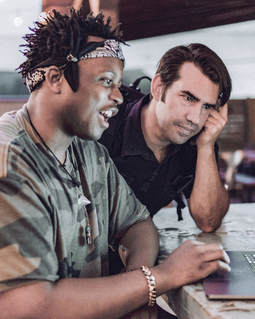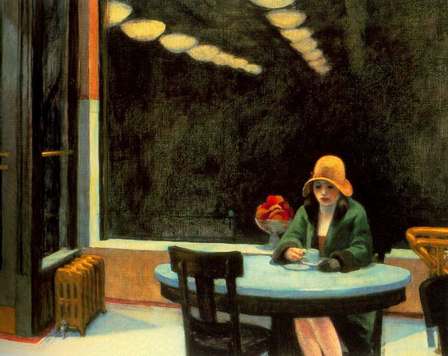 Candid shot of me looking over someone else's work. Photo by Glenn Thompson. Candid shot of me looking over someone else's work. Photo by Glenn Thompson. This wasn’t next on my list but it’s come up more than a few times recently with people posing the question to others seeking advice on what to do. So I thought it would be a good immediate topic to discuss here. This is a universal issue that goes across all creative platforms. I myself have experience not only with photography/cinematography but before that spent most of my free time writing: prose, poetry, essays, screenwriting, song lyrics, etc. I’ve tried them all. So I hope whatever outlet you’re into you can find at least one of these applicable. 1. Take a break I’ve seen in responses others have mentioned for this problem is simply: "Take a vacation." - and while that could work - it’s not always practical and provide the immediate relief you seek. You have to plan far in advance usually and you may not have the time/money/leave from work possible. So not high on my list. In the short term something I’ve done that has worked is take a day trip - go outside the city - short distance - out into nature preferably. Take a hike, or even a long walk around your neighborhood, work up a sweat, let your mind wander. Exercise. Losing yourself that you're not thinking about a solution to a problem is often when it presents itself to you. Either way I always return feeling refreshed and ready to tackle the next thing. 2. Look back through old work (e.g. old photos, old writings, old drawings, old ideas for projects, old whatever) This was the topic of my last post in case you missed it. If you’re in a rut this means you’re probably past the beginner stage and have some miles behind you that you can look into the rearview mirror on. This can show you how far you’ve gone, how you’ve changed. You may stumble upon a project that was unfinished that you thought was a pretty good idea then and even now and you can work on it (with your new found wisdom) and finish it. Bonus! 3. See how others do it I know for photographers - editing is a large part of how we develop a personal style. There are lots of video tutorials (Youtube) on how certain successful/popular photographers edit their photos. This is mostly how I learned how to use Light Room proficiently. You can learn new tricks and short cuts. Try playing with the different sliders to alter the colors or contrast or saturation, etc. I imagine there's stuff like that for illustrators, musicians, writers too maybe. One famous author, I forget who now, said he actually wrote down word for word The Great Gatsby because he wanted to know what it felt like to write such a great novel. 4. Limitations Place limitations on yourself. Seems paradoxical. It forces you to get creative. For photographers perhaps try to go out and shoot with only one prime lens. Try different angles you wouldn’t normally use. Don’t be afraid to get down and dirty. For writers try using free association or stream of consciousness to spark ideas or create connections. 5. Outside Resources Pick up a motivational book. I picked up some from the library recently - ones that Jordan Hefler recommended - that also helped inspired me to write this post. Also you could try a book that focuses on technique. For me I haven’t always paid close attention to certain technical aspects - for instance structure in screenwriting. I recall having some internal issues trying to sort out how I develop this one screenplay. I found an old copy of The Art of Dramatic Writing by Lajos Egri I had from school and reading through it with my story in mind helped me to map it out. 6. Perfection Maybe your problem is your perception of your work. Furthermore this idea of Perfection. It’s okay to strive for it, but know that it’s impossible to reach it. Nothing is beyond criticism. Don’t let it be a hang up so you sit there tinkering with it for hours, days, months, even years, and not really improving up on it. The purpose should be to create something to put it out there and move on to the next thing. Elizabeth Gilbert writes in her book Big Magic: “Perfection is just fear in fancy shoes and a mink coat pretending to be elegant when it’s actually just terrified.” My mom calls me a perfectionist. I always thought it was complimentary but now it doesn't seem as such, considering I have so many unfinished projects. "Done is better than good," Elizabeth Gilbert's mom used to tell her growing up. I think that's what my mom was trying to say but it was more veiled. 7. Other Artists outside your field Look at creative work outside of your wheelhouse that can inspire you. For me: two that I love are music and painting. I can do neither one. In fact I can’t draw, paint, sing, or play an instrument, but I appreciate those who can and they have influence on my work. Music especially can set the tone or mood that you’re going for while you’re working. I used to go on long walks at night listening to slow depressing songs and let my brain make connections till some story would present itself. Then go home and write it down. Or I’d bring my pocket notebook and jot down ideas. Speaking of you should have some type of notebook or electronic device on you at all times that you can scribble down those random ideas that come to you throughout the day, that you'll forget if you don't put them in ink or e-ink. Then you can look back on them in your down time. I started this practice back in grad school and still have all my old pocket notebooks. 8. Remember Why You Started Think about the movies/shows, bands/songs, books, writers, artists, etc. that really inspired you to go into what your chosen field and revisit them. If it’s been more than a year or two at least since your last time then you’ll likely experience it in a different way now. It’s possible they may not hold up as well, but also possible you can understand them at a deeper level now. There's probably more to what you do than you knew going in. So much time/energy/focus goes into process. We can get bogged down with it. Of course it helps when you learn to love the process. In Steal Like an Artist - Austin Kleon advises to make what he calls a "Swipe file." This is where you add all the things that you like and are inspired by - to periodically go back and borrow from. 9. Make time for your own personal projects Early on when I was getting started I bought a little old 35mm Canon rangefinder camera (called a Canonet 28) from a dude off Craigslist for cheap. I figured it would be fun to play with - and if didn’t work or I got tired of it - it would still make for a great decorative paperweight. He told me he was selling off all his old gear. He first got into photography because he enjoyed it and people told him he took good pictures and ought to become a professional. Soon he was doing it all from events to senior portraits then weddings. But then after a while it wasn’t fun anymore. It just became a job like any other and he was burnt out on it. His advice was to do all you can to keep it enjoyable. I took this advice to heart and have always tried to make time for my own little creative projects to keep things fresh and interesting (and have also avoided shooting weddings ha). If you’re like me you need to feel as if you’re using your creative mind - or right side of your brain. Some shoots feel more like work than others and that’s fine if they pay well, but they can’t all feel like work then you may as well go do something else. Point is to at least try to work in some time to spend on your own projects large and small to not get burnt out. 10. Be a student of the game then become a master I've saved the best for last. Maybe you've heard this one already. It's a very simple concept. For me when I heard it it was like an epiphany. Which is this: Create something that you yourself would want to see/read/hear. There's a lot of pictures and songs and paintings and such out there that I really like, but not a lot that I feel I really personally identify with. Ones that are totally in tune with my sensibilities. If say you read a book or see a movie and be into it up until it goes off in a different direction than you would have liked, then think how you can incorporate that into your work. Of course you can't do that until you have a good grasp of what's been done - both classic and contemporary. That was the approach I began taking with my writing and it helped a lot. It felt like I was doing more of my own thing and it was authentic. I honestly haven't done that for much of my photography but have been thinking more about it. Further reading: Big Magic - Elizabeth Gilbert Steal Like an Artist - Austin Kleon Show Your Work - Austin Kleon The Subtle Art of Not Giving a F*ck - Mark Manson You are a Badass: How to stop doubting your greatness and starting living an awesome life - Jen Sincero
0 Comments
Leave a Reply. |
AuthorArchives
November 2021
Categories |

 RSS Feed
RSS Feed
